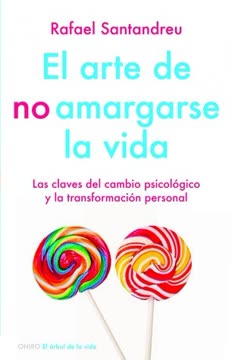Key Takeaways
1. Take responsibility for your emotions and actions
You are the sum total of your choices, and every one of the "I am's" that you prize so highly can be preceded by "I chose to be".
Your emotions are choices. You have the power to control your thoughts and feelings, rather than being controlled by external circumstances. This shift in perspective allows you to take charge of your life and make conscious decisions about how you react to situations.
Recognize your power to choose. Instead of blaming others or circumstances for your feelings, acknowledge that you are responsible for your emotional reactions. This doesn't mean ignoring external factors, but rather understanding that your interpretation of events shapes your experience.
Practice self-awareness. Pay attention to your thoughts and emotional patterns. When you catch yourself in a negative spiral, pause and ask:
- What am I telling myself about this situation?
- Is this interpretation helpful or harmful?
- How can I choose a more empowering perspective?
2. Live in the present moment
The present moment is the key to understanding a positive life. Being in touch with your "now" is at the heart of effective living.
Focus on the now. The only moment you can truly experience and influence is the present. By dwelling on the past or worrying about the future, you rob yourself of the opportunity to fully engage with life as it unfolds.
Cultivate mindfulness. Practice being fully present in your daily activities:
- When eating, savor each bite and notice the flavors and textures
- During conversations, listen attentively without planning your response
- While walking, observe your surroundings and physical sensations
Let go of regret and anxiety. Recognize that the past cannot be changed and the future is uncertain. Instead of wasting energy on what-ifs and maybes, channel your focus into making the most of the present moment. This shift can lead to greater contentment and effectiveness in your life.
3. Break free from the approval trap
The need for approval of others implies that what they think of me is more important than what I think of myself.
Recognize the cost of seeking approval. Constantly seeking validation from others can lead to:
- Loss of personal authenticity
- Emotional instability based on others' opinions
- Inability to make decisions without external input
Develop self-approval. Build a strong sense of self-worth that doesn't depend on others' opinions:
- Set personal standards and values
- Celebrate your achievements, no matter how small
- Practice self-compassion when you fall short
Learn to disagree respectfully. It's okay to have different opinions and make choices that others may not understand or approve of. Practice expressing your views confidently while respecting others' right to disagree.
4. Embrace the unknown and take risks
The experience most beautiful is the mysterious. That is the source of all true art and science.
Cultivate curiosity. Instead of fearing the unknown, approach new experiences with a sense of wonder and excitement. This mindset can lead to personal growth, creativity, and innovation.
Challenge your comfort zone. Regularly expose yourself to new situations, ideas, and people:
- Try a new hobby or skill
- Travel to unfamiliar places
- Engage in conversations with people who have different perspectives
Reframe failure as learning. When taking risks, remember that setbacks are opportunities for growth. Ask yourself:
- What can I learn from this experience?
- How can I use this knowledge to improve in the future?
- What strengths did I discover about myself in this challenge?
5. Let go of the need for justice and fairness
If the world were so organized that everything had to be fair, no living creature could survive for a day.
Accept life's inherent unfairness. Recognize that the world doesn't operate on a system of perfect justice. Holding onto the belief that everything should be fair can lead to frustration, resentment, and inaction.
Focus on what you can control. Instead of dwelling on perceived injustices, channel your energy into:
- Personal growth and self-improvement
- Taking positive action in your sphere of influence
- Cultivating gratitude for the good things in your life
Practice empathy and understanding. When faced with seemingly unfair situations, try to consider different perspectives. This can help you:
- Reduce feelings of victimhood
- Develop more nuanced views of complex situations
- Respond more effectively to challenges
6. Stop procrastinating and take action
No amount of guilt can solve a single problem.
Recognize the cost of procrastination. Delaying important tasks can lead to:
- Increased stress and anxiety
- Missed opportunities
- Lower quality work due to time constraints
Break tasks into manageable steps. Large projects can feel overwhelming. Divide them into smaller, actionable items:
- Set specific, achievable goals
- Create a timeline with deadlines for each step
- Celebrate small victories along the way
Address underlying fears. Often, procrastination is driven by fear of failure or perfectionism. Confront these fears by:
- Acknowledging that imperfect action is better than no action
- Reframing mistakes as learning opportunities
- Focusing on progress rather than perfection
7. Cultivate independence in relationships
In any human relationship in which two people become one, the result is two half-people.
Maintain your individuality. Healthy relationships allow both partners to grow and maintain their unique identities. Avoid sacrificing your personal goals, interests, and values for the sake of the relationship.
Encourage mutual growth. Support each other's individual pursuits and personal development. This can lead to:
- Increased mutual respect and admiration
- A richer, more dynamic relationship
- Greater resilience in the face of challenges
Practice healthy boundaries. Learn to say no when necessary and respect your partner's right to do the same. Communicate openly about your needs and expectations, and be willing to compromise without losing yourself in the process.
8. Manage anger effectively
The only antidote for anger is the elimination of the internal sentence "If only you were more like me".
Recognize anger as a choice. Understand that anger is not an inevitable response to frustration, but a learned reaction that you can change.
Identify anger triggers. Pay attention to the situations, thoughts, and beliefs that lead to angry reactions:
- Unrealistic expectations of others
- Feeling disrespected or unheard
- Unmet personal needs
Develop healthier responses. Practice alternative ways to deal with frustration:
- Take a pause before reacting
- Use "I" statements to express your feelings and needs
- Engage in problem-solving rather than blame
- Practice empathy and try to understand others' perspectives
By implementing these strategies, you can cultivate greater emotional intelligence, improve your relationships, and lead a more fulfilling life.
Last updated:
FAQ
What's Tus Zonas Erroneas about?
- Self-Help Focus: Tus Zonas Erroneas by Wayne W. Dyer is a self-help book that delves into self-destructive behaviors and how to overcome them.
- Erroneous Zones: It introduces the concept of "erroneous zones," which are mental patterns and beliefs that limit personal growth and happiness.
- Practical Techniques: The book provides practical strategies to help readers break free from these limiting beliefs and embrace a more fulfilling life.
Why should I read Tus Zonas Erroneas?
- Empowerment Through Awareness: The book empowers readers to take charge of their lives by recognizing and changing self-destructive patterns.
- Accessible Guidance: Dyer presents complex psychological concepts in an accessible manner, making it easy to understand and apply.
- Timeless Relevance: The themes of self-responsibility and emotional control resonate with anyone seeking to improve their mental well-being.
What are the key takeaways of Tus Zonas Erroneas?
- Personal Responsibility: Individuals are responsible for their own emotions and happiness, emphasizing the power of choice.
- Living in the Present: Dyer stresses the importance of focusing on the present moment to encourage mindfulness and reduce anxiety.
- Eliminating Self-Defeating Behaviors: The book outlines specific self-defeating behaviors and provides strategies to overcome them.
What are the best quotes from Tus Zonas Erroneas and what do they mean?
- "You Are The Sum Total Of Your Choices": This quote emphasizes the idea that our lives are shaped by the decisions we make.
- "The only moment you can experience something is now": Highlights the importance of living in the present to enhance current happiness.
- "Culpabilidad y preocupación son las emociones más inútiles": Points out that guilt and worry waste valuable time and energy.
What are the "erroneous zones" mentioned in Tus Zonas Erroneas?
- Definition: These are mental patterns and beliefs that lead to self-sabotage and prevent individuals from achieving their true potential.
- Examples: Include the need for approval, guilt, and rigid thinking, which Dyer addresses in detail.
- Cultural Influences: Societal norms and expectations contribute to these zones, making it essential to recognize and challenge them.
How does Wayne W. Dyer suggest we take control of our emotions in Tus Zonas Erroneas?
- Recognizing Choices: Individuals have the power to choose how they feel, encouraging self-awareness of emotional responses.
- Mindfulness Practice: Advocates for being present in the moment to manage emotions effectively and reduce anxiety.
- Reframing Thoughts: Suggests reframing negative thoughts into positive affirmations to promote a healthier mindset.
What methods does Wayne W. Dyer recommend for eliminating self-destructive behaviors in Tus Zonas Erroneas?
- Self-Reflection: Encourages examining thoughts, feelings, and behaviors to understand their origins and impacts.
- Setting Goals: Recommends setting specific, achievable goals to replace self-destructive behaviors with positive actions.
- Consistent Practice: Stresses the importance of consistent practice in changing behaviors, requiring patience and persistence.
How can I apply the concepts from Tus Zonas Erroneas in my daily life?
- Daily Affirmations: Incorporate affirmations that reinforce positive self-talk and self-acceptance.
- Mindfulness Techniques: Practice mindfulness techniques such as meditation to stay present and reduce anxiety.
- Journaling: Keep a journal to track thoughts and feelings, identifying patterns of self-destructive behavior.
How does Tus Zonas Erroneas address the concept of self-esteem?
- Foundation of Self-Worth: Emphasizes that self-esteem is crucial for personal happiness and fulfillment.
- Self-Acceptance: Promotes self-acceptance as a key component of healthy self-esteem, encouraging embracing flaws and strengths.
- Empowerment Through Choices: Links self-esteem to the ability to make choices that align with one’s values and desires.
How does Wayne W. Dyer suggest overcoming the fear of the unknown in Tus Zonas Erroneas?
- Embrace Spontaneity: Encourages being open to new experiences and acting on impulses without overthinking.
- Challenge Rigid Beliefs: Suggests questioning the need for reasons behind actions to promote exploration and growth.
- Practice Self-Acceptance: Accepting oneself and life's unpredictability can reduce anxiety associated with the unknown.
What techniques does Wayne W. Dyer recommend for improving self-esteem in Tus Zonas Erroneas?
- Positive Self-Talk: Emphasizes replacing negative self-talk with affirmations that reinforce self-worth.
- Setting Personal Goals: Encourages setting and pursuing goals that align with personal values to foster achievement.
- Letting Go of Perfectionism: Advises against the need for perfection, suggesting that embracing imperfection can lead to greater self-acceptance.
How does Tus Zonas Erroneas address the concept of guilt?
- Guilt as a Barrier: Explains that guilt often stems from societal expectations and can hinder personal growth.
- Reframing Guilt: Encourages reframing guilt as a learning opportunity rather than a negative emotion.
- Self-Forgiveness: Advocates for self-forgiveness as a crucial step in overcoming guilt and moving forward.
Review Summary
Your Erroneous Zones receives mostly positive reviews, praised for its revolutionary ideas on self-improvement and personal growth. Readers appreciate its practical advice on overcoming negative thoughts and behaviors. Many found it life-changing, helping them gain new perspectives on relationships and self-esteem. Critics argue some concepts are outdated or oversimplified. The book's enduring popularity is evident, with many readers revisiting it multiple times. Some translations are criticized for poor quality. Overall, it's considered a classic self-help book that continues to resonate with readers decades after its publication.
Similar Books





Download PDF
Download EPUB
.epub digital book format is ideal for reading ebooks on phones, tablets, and e-readers.













